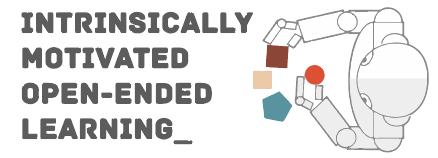| Gianluca Baldassarre |
| speaker |
Bio
Gianluca Baldassarre received a bachelor and master in economics, 1998, and a Specialization Course in “Cognitive Psychology and Neural Networks”, 1999, from the Sapienza University of Rome, Italy, and a PhD in Computer Science, 2003, from the University of Essex, Colchester, U.K. He later joined the Italian Institute of Cognitive Sciences and Technologies, National Research Council, Rome, Italy where he was: Postdoc; Researcher since 2006, Director of Research since 2021, Coordinator of the Research Group ISTC-CNR “Laboratory of Embodied Natural and Artificial Intelligence” since 2016, and Coordinator of the EU Projects “IM-CLeVeR – Intrinsically Motivated Cumulative Learning Versatile Robots”, 2009-2013, and “GOAL-Robots – Goal-based Open-ended Autonomous Learning Robots”, 2016-2021, and President of the “Advanced School in AI” since 2018. His research interests span open-ended learning of sensorimotor skills, driven by extrinsic and intrinsic motivations, in animals, humans, and robots.
Google scholar page
Talk
In the literature related to the development of intrinsically motivated systems, the focus is usually on the phase in which the agents’ only task is to explore the environment and acquire as much knowledge and skills as possible, with the idea that these will later be useful for the achievement of assigned tasks. Similar to more standard reinforcement learning scenarios, in which the sole objective is reward maximisation, in IMOL agents there is usually only one type of intrinsic signal that is maximised. Hardly ever different types of motivation are put together, and where it happens intrinsic motivations are often simply used as exploration bonus. Our interest is in developing motivational systems that hold different motivations together: this involves thinking about which ones to include, how to balance them and what are the most appropriate mechanisms to manage these processes in guiding learning. In addition, and no less important, it is crucial to focus on the fact that in order to maximise the positive effects of autonomous open-ended learning, it is necessary for it to be guided by a purpose (possibly externally assigned) that limits the uncontrolled explosion of goals and behaviours generated solely on the basis of curiosity.
Talk shared with Vieri Giuliano Santucci
